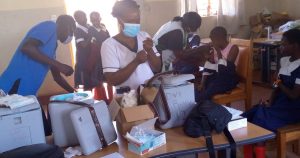
Bethel Okeke, BPharm | Associate Director, GPH, Vaccines | Africa
Cervical cancer remains a significant public health concern in Nigeria, with over 12,000 new cases and nearly 8,000 deaths recorded in 2020. Human papillomavirus (HPV) is the primary culprit behind this deadly disease, and vaccination has proven to be a cost-effective and potentially lifesaving measure to combat it. However, numerous challenges, including the cost of vaccines, limited healthcare infrastructure, a shortage of qualified personnel, and disruptions caused by the COVID-19 pandemic, have hindered widespread HPV vaccination in Nigeria.
The comprehensive strategy proposed by Holden Fitzgerald to tackle these challenges and enhance HPV vaccination in Nigeria. By addressing issues related to cost, healthcare workforce, infrastructure, community engagement, and adaptability, Holden Fitzgerald aims to make HPV vaccination accessible and effective for Nigerian girls, reducing the burden of cervical cancer and saving lives.
The Holden Fitzgerald Approach: A Holistic Strategy
1. Healthcare Workforce Expansion
Problem: Nigeria faces a severe shortage of qualified healthcare personnel, particularly in rural areas. This shortage limits the capacity to administer vaccines effectively.
Solution: Holden Fitzgerald’s strategy includes initiatives to bolster the healthcare workforce:
– Training and Capacity Building: Collaborating with medical schools and institutions to increase the number of healthcare workers trained in vaccine administration.
– Community Health Workers (CHWs): Leveraging the extensive network of CHWs to provide vaccine education and administer vaccines in remote areas where access to healthcare facilities is limited.
– Telemedicine: Exploring telemedicine solutions to connect remote communities with healthcare professionals for vaccine consultations and post-vaccination monitoring.
2. Infrastructure Enhancement:
Problem: Nigeria’s healthcare infrastructure, including cold storage facilities and transportation logistics, is often inadequate for efficient vaccine distribution, particularly in rural and hard-to-reach areas.
Solution: Holden Fitzgerald will invest in infrastructure improvements:
– Cold Chain Strengthening: Upgrading cold storage facilities and providing reliable power sources to maintain vaccine quality.
– Transportation Innovation: Developing innovative transportation solutions, such as vaccine delivery drones, to reach remote communities more effectively.
– Monitoring Systems: Implementing real-time monitoring systems to track vaccine availability and conditions across the country.
3. Community Engagement and Advocacy
Problem: Misconceptions, fears, and cultural barriers can hinder vaccine acceptance in communities.
Solution: Holden Fitzgerald will engage in community-centric strategies:
-Cultural Sensitivity: Collaborating with community leaders, religious institutions, and local influencers to dispel myths, reduce vaccine hesitancy, and build trust.
– School-based Education: Introducing comprehensive sexual education programs in schools that include information about HPV and the importance of vaccination.
– Youth Advocacy: Empowering young advocates to raise awareness about HPV vaccination within their communities, peer groups, and on social media platforms.
4. Adaptability and Resilience
Problem: Unforeseen events, such as the COVID-19 pandemic, can disrupt vaccination schedules and outreach efforts.
Solution: Holden Fitzgerald recognizes the need for adaptability and resilience:
– Emergency Response Plans: Developing robust contingency plans to address unexpected crises, ensuring that vaccine programs can continue even during disruptions.
-Digital Solutions: Expanding the use of telehealth and digital platforms to maintain communication with healthcare workers and communities during emergencies.
Implementation and Collaboration
Holden Fitzgerald’s strategy for enhancing HPV vaccination in Nigeria is built on collaboration with government agencies, non-profit organizations, pharmaceutical companies, healthcare institutions, and local communities. By forging partnerships, sharing expertise, and pooling resources, Holden Fitzgerald aims to create a synergistic effort to overcome the barriers to HPV vaccination in Nigeria.
Government Partnerships
– Advocating for Policy Change: Holdenfitzgerald will work closely with Nigerian health authorities to advocate for policy changes that support affordable and accessible HPV vaccination.
– Resource Allocation: Collaborating with government agencies to allocate resources for healthcare infrastructure improvements, including cold storage facilities and transportation networks.
-Regulation and Oversight: Ensuring that vaccines meet international quality standards and are subject to rigorous safety assessments.
Pharmaceutical Industry Collaboration
-Negotiating Vaccine Prices: Partnering with pharmaceutical companies to negotiate lower vaccine prices and secure donations for the most vulnerable populations.
-Research and Development: Encouraging investment in research and development for more affordable and easily accessible HPV vaccines.
Non-profit Organizations and NGOs
– Community Engagement: Collaborating with non-profit organizations and NGOs with extensive experience in community engagement to foster trust and acceptance of vaccination.
– Training and Capacity Building: Partnering with organizations specializing in healthcare workforce development and training to expand the pool of qualified healthcare workers.
Local Communities
– Empowering Youth: Engaging local youth as advocates for vaccination within their communities, leveraging their influence to break down barriers.
-Cultural Sensitivity: Respecting and understanding the cultural norms and beliefs of each community to tailor vaccination programs accordingly.
Monitoring and Evaluation
To ensure the effectiveness of the HPV vaccination strategy, Holden Fitzgerald will establish a robust monitoring and evaluation system. This system will involve:
– Regular assessment of vaccination coverage rates across regions, schools, and age groups.
– Real-time tracking of vaccine availability and cold chain maintenance.
– Community surveys and feedback mechanisms to gauge vaccine acceptance and address concerns promptly.
– Collaboration with healthcare providers and local authorities to report adverse events and ensure a swift response.
Holden Fitzgerald’s holistic approach to enhancing HPV vaccination in Nigeria addresses the multifaceted challenges that have hindered progress in the fight against cervical cancer. By prioritizing cost-effective vaccination programs, expanding the healthcare workforce, improving infrastructure, engaging communities, and promoting adaptability, Holden Fitzgerald aims to make HPV vaccination accessible to all eligible Nigerian girls.
Through working closely with government agencies, pharmaceutical companies, non-profit organizations, and local communities, Holden Fitzgerald aims to create a coordinated effort that can significantly reduce the burden of cervical cancer in Nigeria.
Ultimately, the success of this endeavor will not only save lives but also serve as a model for tackling similar challenges in other low- and middle-income countries, bringing us closer to a world where cervical cancer is a preventable disease, and no girl’s future is jeopardized by this devastating illness.


mexican pharmaceuticals online: mexican online pharmacy – mexico pharmacy
I like this weblog very much, Its a really nice post to read and obtain information.Blog range
world pharmacy india: india pharmacy mail order – cheapest online pharmacy india
http://indiapharmast.com/# indian pharmacy online
northern pharmacy canada reputable canadian pharmacy canadian pharmacy 365
mexican pharmacy mexico pharmacies prescription drugs mexico drug stores pharmacies
canadian pharmacy ed medications: canadian pharmacy online – canadian pharmacy 24 com
mexico pharmacy: mexican rx online – pharmacies in mexico that ship to usa
indian pharmacy paypal п»їlegitimate online pharmacies india best online pharmacy india
mail order pharmacy india: online shopping pharmacy india – Online medicine home delivery
indian pharmacy: india pharmacy mail order – cheapest online pharmacy india
https://canadapharmast.online/# best mail order pharmacy canada
reputable indian online pharmacy: world pharmacy india – india pharmacy
pharmacy canadian superstore prescription drugs canada buy online the canadian drugstore
https://indiapharmast.com/# best online pharmacy india
reputable mexican pharmacies online: medicine in mexico pharmacies – mexican drugstore online
online shopping pharmacy india: reputable indian pharmacies – india pharmacy
Online medicine order: top 10 pharmacies in india – buy medicines online in india
Online medicine home delivery top online pharmacy india online pharmacy india
indian pharmacies safe: top 10 online pharmacy in india – india online pharmacy
buying from online mexican pharmacy: buying prescription drugs in mexico – mexican rx online
world pharmacy india online pharmacy india indianpharmacy com
cheapest online pharmacy india: online pharmacy india – india pharmacy mail order
https://canadapharmast.com/# www canadianonlinepharmacy
https://indiapharmast.com/# india pharmacy
buying from online mexican pharmacy: medication from mexico pharmacy – buying prescription drugs in mexico online
canada pharmacy online: recommended canadian pharmacies – legitimate canadian mail order pharmacy
mexican online pharmacies prescription drugs: medication from mexico pharmacy – mexican mail order pharmacies
mexican border pharmacies shipping to usa: mexico drug stores pharmacies – buying prescription drugs in mexico
legitimate canadian mail order pharmacy my canadian pharmacy reviews best canadian pharmacy online
indian pharmacy online: india pharmacy mail order – online shopping pharmacy india
canadian discount pharmacy canada pharmacy online legit pharmacy rx world canada
canadian pharmacy meds review: canadian pharmacy world – canadian world pharmacy
buying from online mexican pharmacy: mexico drug stores pharmacies – best online pharmacies in mexico
canadian world pharmacy: canadian pharmacy online reviews – canadian neighbor pharmacy
http://indiapharmast.com/# cheapest online pharmacy india
mexican rx online: buying from online mexican pharmacy – purple pharmacy mexico price list
https://foruspharma.com/# mexico drug stores pharmacies
ciprofloxacin 500mg buy online: where can i buy cipro online – buy generic ciprofloxacin
https://doxycyclinedelivery.pro/# purchase doxycycline
http://ciprodelivery.pro/# buy cipro cheap
buy cipro online without prescription: п»їcipro generic – where can i buy cipro online
http://paxloviddelivery.pro/# п»їpaxlovid
paxlovid covid: Paxlovid buy online – п»їpaxlovid
https://doxycyclinedelivery.pro/# doxycycline 400 mg brand name
http://amoxildelivery.pro/# amoxicillin 250 mg
https://amoxildelivery.pro/# amoxicillin 500mg capsules
doxycycline 100 capsules: doxycycline tablets 100mg – 20 doxycycline
buy cipro without rx: buy cipro without rx – buy ciprofloxacin over the counter
http://ciprodelivery.pro/# buy cipro online canada
https://clomiddelivery.pro/# buy generic clomid without rx
http://paxloviddelivery.pro/# paxlovid generic
can i order cheap clomid without rx: can i order generic clomid online – rx clomid
doxycycline price australia: doxycycline 1000mg – doxycycline 100mg cap price
http://ciprodelivery.pro/# cipro
http://paxloviddelivery.pro/# paxlovid generic
https://clomiddelivery.pro/# get cheap clomid without rx
paxlovid india: paxlovid cost without insurance – paxlovid india
http://ciprodelivery.pro/# ciprofloxacin over the counter
order generic clomid without insurance: buying generic clomid without a prescription – how can i get cheap clomid without dr prescription
http://ciprodelivery.pro/# cipro online no prescription in the usa
https://doxycyclinedelivery.pro/# doxycycline over the counter south africa
paxlovid pill: paxlovid covid – paxlovid cost without insurance
http://doxycyclinedelivery.pro/# doxycycline acne
how to get generic clomid no prescription: cheap clomid – get clomid without rx
https://doxycyclinedelivery.pro/# doxycycline 400 mg price
order generic clomid tablets: generic clomid without rx – how to get clomid pills
where buy clomid online: cheap clomid pills – can you buy generic clomid without a prescription
paxlovid pharmacy: paxlovid for sale – paxlovid pill
how can i get cheap clomid price: order generic clomid pill – order generic clomid pills